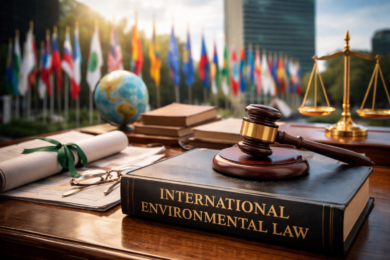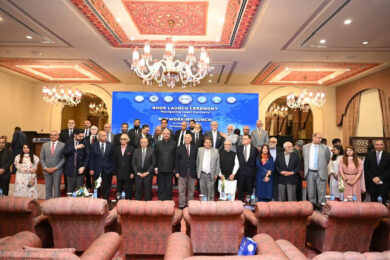The only aftermath of Twenty-Seventh constitutional amendment happens to be the re-emergence of the debate surrounding the scope of parliament’s amending power. This renewed relevance necessitates […]
Allocating Climate Burdens Fairly: The Role of CBDR in International Law
In its recent advisory opinion on States’ obligations in relation to climate change, the ICJ addressed several important dimensions of international environmental law. Most notably, it […]
Construction Works: Services or Goods?
After the 18th Amendment[1] to the Constitution[2], goods are taxed by the federal legislature, and the services by the provinces[3]. There is no concurrency in tax. For a particular transaction, the tax is either levied by the federal legislature, or by the provinces. Under the current framework, the supply of goods is taxed by the center under the Sales Tax Act, 1990. The provinces, after the 18th Amendment, have promulgated provincial legislations to bring the taxation on services within their provincial domain.
Book Review: The Competition Commission of South Asia: Policy Diffusion and Transfer by Dr. Amber Darr
The Competition Law in South Asia: A Policy of Diffusion and Transfer is the first book of its kind in Pakistan on this subject. It is […]
The Precautionary Principle in International Environmental Law
The precautionary principle is often underemphasized in discussions of international environmental law, but this principle is important as it shifts the burden of proof to those […]
Continuing Professional Development for the Legal Community
Continuing Professional Development (CPD) is a vital component of professional life worldwide. In almost every profession, such as medicine, engineering, accounting, teaching, and public administration, professionals […]
Supreme Court Upholds Wedlock Policy: A Landmark Ruling on Family Protection in Pakistan’s Civil Service
The case Mubashir Iqbal Zafar v. Ministry of Defence, through its secretary, was recently decided by the Honorable Ms. Justice Ayesha A. Malik regarding the implementation […]
Why the UN Treaty on Plastic Pollution Failed, Again.
Earlier this year, the second part of the fifth session of the Intergovernmental Negotiating Committee (INC) came to a close. Just by this, you can tell […]
The IHC’s Intervention on Sewerage Workers’ Rights in Pakistan: A Constitutional Reckoning
The Islamabad High Court’s recent judgment, addressing the hazardous and degrading working conditions of sewerage laborers, represents a significant development in Pakistan’s constitutional discourse on equality, […]
Minority Rights and the National Commission for Minorities’ Rights Bill 2025: An Analytical Overview
The National Commission for Minorities’ Rights Bill 2025 represents a landmark step in Pakistan’s legislative response to the protection of religious minorities. This legislation operationalizes a […]
When Morality Creeps Into Justice
Justice Ali Baqar Najafi’s additional note in the Noor Muqaddam judgment – where he frames an unimaginably brutal murder as a warning against “vice” and “living […]
Comparison of 18th, 26th, and 27th Amendments of the Constitution of Pakistan, 1973
The comparison between the 18th Amendment and the later 26th–27th Amendments becomes even sharper when examined through the lens of constitutionalism and the basic structure doctrine. […]
Basic Structure Theory – The Case of Pakistan
The debate over the “Basic Structure” of the Constitution of Pakistan resurfaces after every major constitutional amendment. The theory suggests that certain core features of a […]
Fearing Purposivism: the Pakistani Supreme Court and its Overturning of Pragmatic Judgments
Introduction: Late Justice Antonin Scalia of the United States Supreme Court was a curmudgeonly textualist. So hardwired was he to his philosophy of textualism that any […]
NIMA Launches Groundbreaking Maritime Manual at Prestigious Book Launch
Islamabad, October 27, 2025 – The National Institute of Maritime Affairs (NIMA) proudly unveiled its flagship publication, “Navigating Legal Horizons: Seafarers’ Manual on Naval Operations and […]
REMOVING GENDER IMBALANCES IN PAKISTAN
Women constitute more than half of the population of Pakistan. However, they seldom get financial freedom due to the patriarchal nature of the society and structural […]
Should AI Be a Legal Person? Why the Debate Exists and What We Really Need Instead
The public relationship with artificial intelligence is becoming deeply personal. When OpenAI’s GPT-4o was briefly taken offline, users did not simply complain about losing an app but described […]


